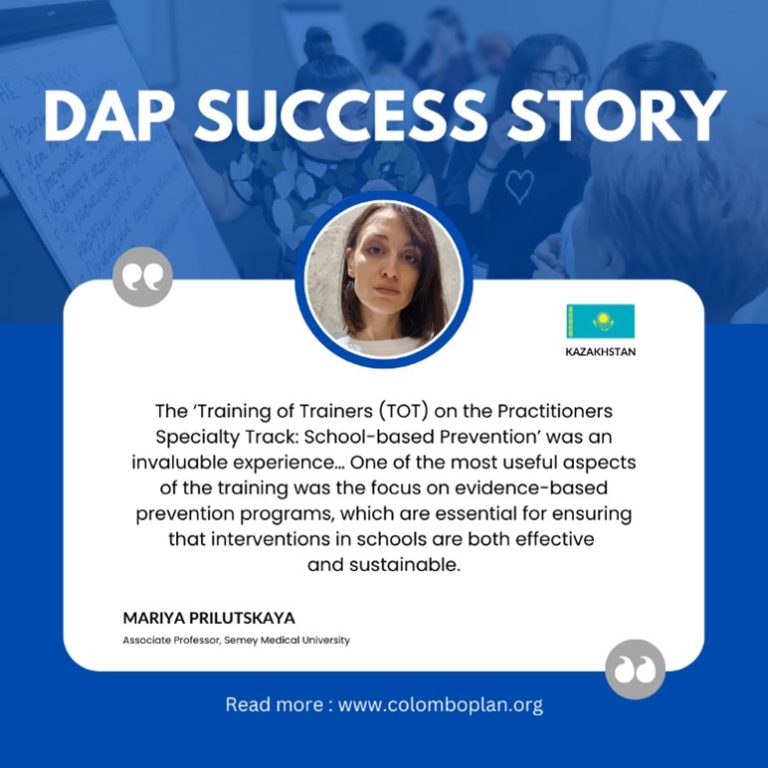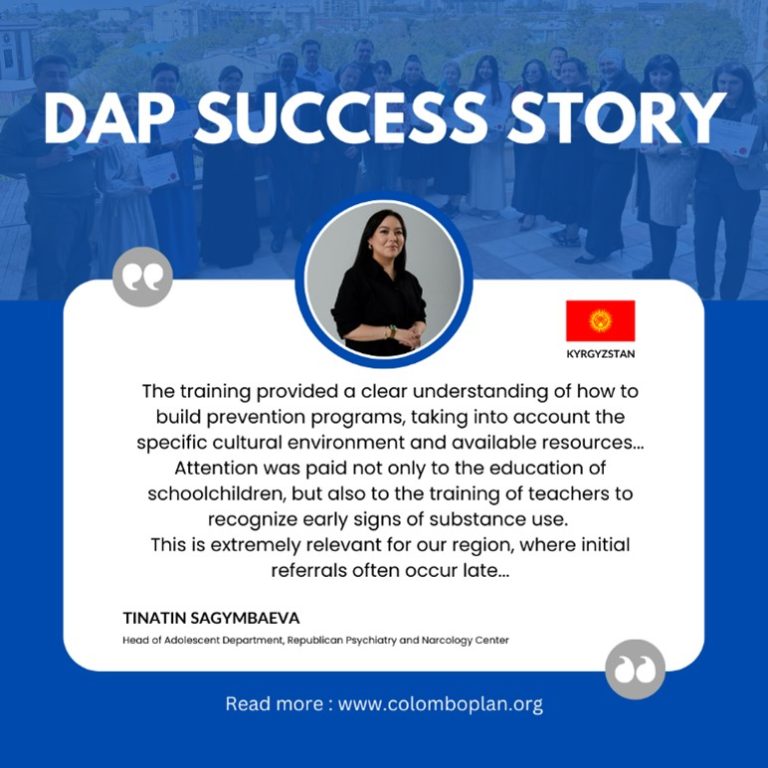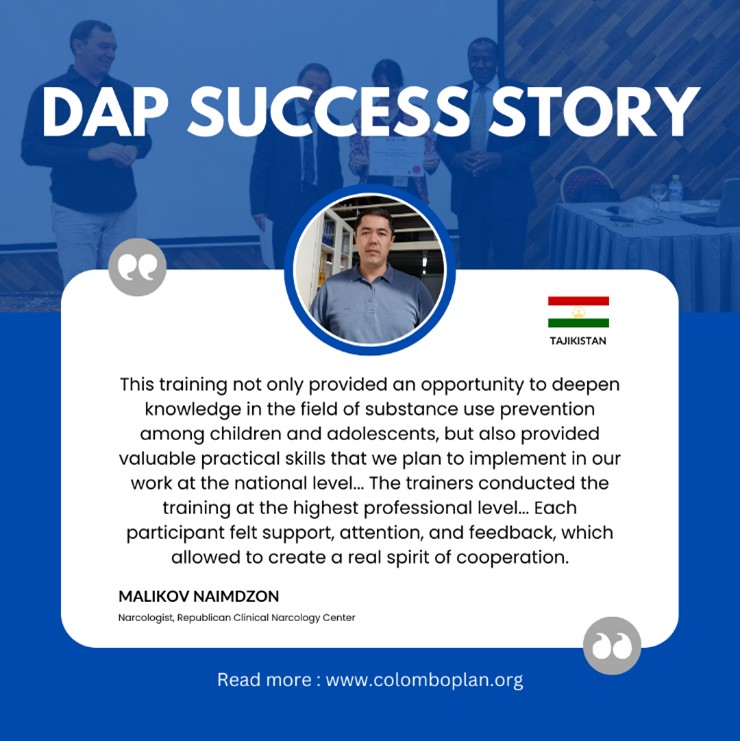


The “Training of Trainers (TOT) on the Practitioners Specialty Track: School-based Prevention,” held in Tashkent, Uzbekistan was an invaluable experience for all participants. This ten-day program provided a deep understanding of the role that schools play in the prevention of drug use, and it offered practical strategies that can be directly applied within educational settings. The comprehensive curriculum covered key topics such as building prevention teams in schools, developing effective substance use policies, and fostering a positive prevention climate.
One of the most useful aspects of the training was the focus on evidence-based prevention programs, which are essential for ensuring that interventions in schools are both effective and sustainable. The trainers introduced a wide range of approaches that have been proven to work in school environments, helping participants understand how to select and implement these programs in their respective contexts.
Additionally, the opportunity to network and share experiences with other prevention practitioners from across Central Asia added immense value to the training. The collaborative environment encouraged knowledge exchange and fostered a sense of regional solidarity in addressing the shared challenge of drug use prevention among youth.
The practical exercises, especially those focused on developing professional plans, were particularly beneficial. These exercises allowed participants to apply the theoretical knowledge gained during the training to real-world scenarios, ensuring that everyone left with a clear action plan to enhance their school-based prevention efforts.
Following the training, one of the immediate priorities will be organizing eco-trainings with educators in the cities of Almaty, Karaganda, and Pavlodar. These eco-trainings will focus on raising awareness among school staff about the importance of drug use prevention and equipping them with the tools and strategies needed to implement evidence-based practices in their classrooms. This initiative will ensure that educators are prepared to create a positive prevention climate and actively participate in school-level prevention teams.
Additionally, efforts will be made to strengthen partnerships with key organizations, including the Ministry of Internal Affairs of the Republic of Kazakhstan. Establishing close collaboration with the Ministry will enhance coordination between schools and law enforcement agencies, ensuring a more comprehensive approach to drug prevention efforts. This will be particularly important for addressing drug use among youth at an early stage and providing timely interventions.
Plans are also underway to adapt the knowledge gained during the training to the local context. In the coming months, consultations will be held with local educational authorities to tailor the developed strategies to the needs and conditions of each city. This localized approach will help ensure the successful implementation of the programs introduced during the eco-trainings.
A key component of the implementation strategy will be the creation of school-based prevention teams. These teams, consisting of teachers, school psychologists, and healthcare staff, will be established in pilot schools in Almaty, Karaganda, and Pavlodar. The teams will play a central role in developing and maintaining a prevention-oriented environment in schools, ensuring that prevention efforts are both coordinated and effective.
As the Head of the Adolescent Department of the Republican Psychiatry and Narcology Centre, I deeply appreciate the importance of such a course. In my work with adolescents, I see every day how important it is to implement timely preventive measures in the educational environment, and this training has become an excellent tool for a systematic approach to solving the problem.
It is especially valuable that the training is based on the principles of the UNODC-WHO International Standards of Drug Use Prevention, adapted to the conditions of educational institutions. In Kyrgyzstan, where the problem of substance use among young people is becoming increasingly important, such training for schools is of paramount importance. The program emphasizes the need for close interaction between school administration, educators, psychologists, and parents, which is extremely important in our context, where family and social ties have a great influence on adolescent behavior.
The training provided a clear understanding of how to build prevention programs, taking into account the specific cultural environment and available resources. It is important that attention was paid not only to the education of schoolchildren, but also to the training of teachers to recognize early signs of substance use. This is extremely relevant for our region, where initial referrals often occur late, when the problem already requires more serious intervention.
Practical assignments and case studies from the course helped to gain a deeper understanding of how prevention work can be adapted to local conditions. The inclusion of interactive methods, such as group exercises and discussions, helps to build trust with adolescents, which is especially important in our practice.
The training also highlighted important criteria for evaluating the effectiveness of prevention programs, which will help us to adjust our approaches in the future and achieve more sustainable results. Overall, the course was not only a source of new knowledge for me, but also a stimulus for me to reconsider some aspects of our work. It gave me confidence that even with limited resources it is possible to implement effective prevention strategies, establish interagency cooperation and strengthen the role of schools in promoting healthy behavior among the younger generation.
Participation of the delegation from the Republic of Tajikistan in the regional training “School-based prevention”, which took place from September 23 to October 3, 2024, in t Tashkent, Uzbekistan was incredibly useful and relevant for us. This training not only provided an opportunity to deepen knowledge in the field of substance use prevention among children and adolescents, but also provided valuable practical skills that we plan to implement in our work at the national level. The trainers conducted the training at the highest professional level. Dr. Richard Gakunju and Dr. Oleg Yussopov demonstrated not only deep knowledge of the topic, but also mastery in knowledge transfer. Each day of the training was carefully organized and full of practical tasks, which contributed to the maximum assimilation of the material. Trainers created a favorable atmosphere for open exchange of opinions, motivated participants to actively participate in discussions and exercises. The trainers' skill in managing groups, structuring sessions, and conducting exercises to develop teamwork skills played a key role in the effectiveness of the training. Each participant felt support, attention, and feedback, which allowed to create a real spirit of cooperation.
The topic of substance use prevention in schools is of critical importance for Tajikistan. Adolescence is a period when it is important not only to inform young people, but also to create favorable conditions for their growth and development, which requires a systematic approach. The training covered important aspects such as the impact of school climate, the role of teachers and the development of effective policies, which is especially relevant in the context of our education system.
We, the trained trainers, plan to translate all the material into Tajik language and implement the knowledge gained through the development of prevention programs adapted to our conditions and conduct echo-trainings for specialists in the field. Of particular interest were the methods of building teams and developing school policies, which will allow us to create a more effective structure for school-based prevention work. This will lead to an increase in the effectiveness of our programs and improve the psychological climate in educational institutions.
We would like to express our sincere gratitude to the organizers of the training for their highly professional approach, careful organization and the training opportunity provided, first to Mr. Borikhan Shaumarov, as well as to the donor organizations whose support made it possible to hold this valuable educational event. Their contribution is key in broadening our professional horizons and improving the quality of our services to our communities. It should be noted that the knowledge and skills acquired at this training and their application in practice will lead to positive changes in the system of substance use prevention in Tajikistan and allow us to make our schools a safer and healthier place for children.
With deep respect the delegation from Tajikistan
Malikov Naimdzon - Narcologist, State Institution “Republican Clinical Narcology Center named after Professor M. Gulyamov” of the Ministry of Health and Social Protection of the Republic of Tajikistan
Ismatova Tahmina - Head of the Prevention Department of the State Institution "National Center for Monitoring and Prevention of Drug Abuse"
Qurbonalizoda Loiq - Deputy Head of the Department for Drug Control and Drug Use Prevention of the Drug Control Agency under the President of the Republic of Tajikistan
We express our deep gratitude to the organizers for the opportunity to participate in the school-based substance use prevention training, which took place from 23 September to 3 October 2024 in Tashkent, Uzbekistan. The event left indelible impressions due to the high level of organization, starting from meeting the participants at the airport and ending with accommodation in a comfortable hotel and catering.
The training provided a unique opportunity for prevention practitioners from all Central Asian countries to exchange knowledge and experience in the field of prevention. We would like to emphasize the qualification and professionalism of the trainers, including Oleg Yusupov and Richard Gakunju, whose sessions were full of relevant information and practical exercises.
The training program was carefully thought out and included many interactive elements, which allowed participants not only to deepen theoretical knowledge, but also to develop practical skills in the field of substance use prevention among schoolchildren. We gained valuable tools to develop and implement effective prevention programs that will contribute to a safe and healthy learning environment.
This training was a significant step in strengthening professional ties and improving the skills of professionals involved in the prevention of drug and substance use in schools. We are grateful for the opportunity to participate and look forward to further cooperation and support in this important area.
Don’t miss our future updates! Get Subscribed Today!
©2024. The Colombo Plan Secretariat. All Rights Reserved.